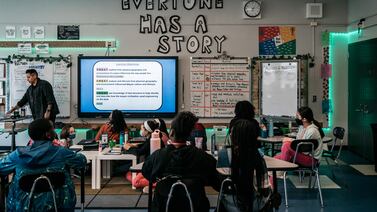How to fund Colorado schools in ways that reflect student needs. How to open college opportunities to more students. How to narrow pandemic learning gaps, especially in math.
When Colorado lawmakers convene Jan. 9, they’ll have pressing education issues to address, competing needs to balance, and a tricky budget to navigate.
Expect bills that seek to address youth mental health, school safety, and teacher shortages. Lawmakers could find bipartisan agreement on efforts to improve math instruction and better connect higher education and job opportunities. But debates over rewriting the school finance formula and overhauling the school accountability system could divide Democrats.
For a fifth session, Democrats will control both chambers and the governor’s office. They grew their majorities in November’s election. The Colorado General Assembly will be full of new members, many from the progressive wing of the party, potentially introducing new political dynamics.
At the same time, lawmakers with a long history of engagement on education issues have moved into leadership positions. Members of a special committee on school finance, for example, now lead the House Democrats, the Senate Republicans, and the powerful Joint Budget Committee. The House Education Committee has at least four former teachers, a former school board member, and members with experience in mental health and higher education administration.
Colorado economists expect the state to have more money in its 2023-24 budget, but inflation will play an outsize role controlling spending. And the risk of a recession could diminish revenue. Questions of short-term uncertainty and long-term sustainability will affect K-12 and higher education.
Here are seven issues we’ll be watching in the 2023 legislative session:
Colorado could get a new school funding formula — or not
Is this the year? The interim committee on school finance has been trying for five years to rewrite a decades-old school finance formula that nearly everyone agrees is unfair.
In November, the bipartisan committee voted unanimously to begin reworking the formula to better account for student needs and educational changes like fifth-year high school students taking college classes.
The chair of the school finance committee, state Rep. Julie McCluskie, is also the incoming speaker of the House and has the power to marshal support for a new approach. But rewriting the school finance formula will be politically challenging.
The current formula sometimes sends more money to well-off districts than to ones serving more students in poverty, and no school district wants to get less than they get now. Bret Miles, head of the Colorado Association of School Executives, said his members would object to a formula rewrite that “takes from one school district to give it to another.”
State Sen. Rachel Zenzinger, chair of the Joint Budget Committee, said one of her priorities will be developing a “hold-harmless” provision for the new formula. Fewer students and higher local property tax revenues take some pressure off state education funding obligations. Lawmakers could use that cushion, she said, then phase in a new formula to ensure no district gets less than it does now.
Brenda Dickhoner, president and CEO of the conservative education advocacy group Ready Colorado, expects Republicans to push their own priorities for school finance, which means more focus on money following students and less concern for the impact on district budgets.
Dickhoner said she hopes all sides are “at the table thinking about how we can more equitably fund our students and really get to a student-focused formula.”
Colorado could make a push on math instruction
State and national test data show that students’ math skills took a bigger hit from pandemic learning disruptions than did reading. Right now, Colorado doesn’t have the tools to address it.
House Education Chair Barbara McLachlan said she’s working with Gov. Jared Polis’ office on legislation that would better train teachers on best practices in math instruction and make training available to parents so they can better support their children.
In his November budget letter, Polis called on lawmakers to ensure that every school district adopts high-quality instructional materials and training and gets all students back on track in math.
How to improve math skills also remains a priority for conservatives. Dickhoner said her organization is looking to higher-performing states for ideas.
The push comes after years of intense focus on improving reading scores. Expect the debate over the math bills to mirror ones about reading instruction, including how much the state should be involved in setting curriculum.
There’s never enough money for either K-12 or higher ed
Last year Colorado flirted with fully funding its K-12 system after years of holding back money for other budget priorities. But a last-minute deal to reduce property tax increases would have reduced state revenues, and Democrat lawmakers held back.
Getting more funding for schools is always a top priority for the Colorado Education Association, the state’s largest teachers union, but wiping out the withholding known as the budget stabilization factor and fully funding Colorado schools are unlikely to happen this year.
Colorado will have less money overall after voters approved two ballot measures — one lowering the income tax rate and the other setting aside money for affordable housing. That shouldn’t cut into budgetary spending, but will reduce the buffer the state has in case of an emergency.
Zenzinger said it’s important to increase K-12 spending and that lawmakers hope to do better than the $9.1 billion proposed by Polis in his budget recommendation.
But budget writers also have their eye on long-term sustainability and any future recession.
The picture is different for higher education, which has to fight for scraps. Polis wants to increase university budgets and financial aid by 6.8%. Schools are expected to make a case for more funding, especially to keep tuition low and because inflation exceeds that.
Metropolitan State University of Denver President Janine Davidson said the school will seek more investment from lawmakers. Programs to help students from low-income backgrounds or who are the first to go to college in their family are costly, she said. And the state funds schools with a lower share than it did 30 years ago.
College access could be increased
Lawmakers also may address how to ensure students can get to and stay in college.
Elaine Berman, Colorado Trustees Network chair, said college board members want more support for students who need skills or credentials for in-demand jobs. School trustees want more funds to build partnerships with businesses and communities to better connect college degrees to jobs, she said.
Lawmakers also may explore how to make it easier for students to get college and workforce skills earlier, including extending opportunities in college and vocational schools.
The Colorado Community College System also wants more college options for incarcerated people. The federal government will begin to allow those students access to federal grants, and the system wants the state to prepare for the changes. It’s also a priority for Representative-elect Matthew Martinez, D-Monte Vista, who led Adams State University’s prison education program.
“I think it’s time that we really boost up education for this population,” Martinez said.
Meanwhile, the Colorado Department of Higher Education has a small agenda starting with removing military draft questions from college enrollment applications, which colleges report stops some students from enrolling.
Students are leaving financial aid on the table
Advocacy groups plan to ask lawmakers to make filling out the FAFSA a requirement to graduate. That’s the federal application for financial aid, and each year Colorado students who don’t finish the form leave behind almost $30 million in federal grants. Plus students who fill out the FAFSA are more likely to go to college, according to research.
“We want to make sure that we get it right,” said Kyra DeGruy Kennedy, Rocky Mountain region director for the advocacy group Young Invincibles. “And so if that means we have to wait another year, we’ll totally wait another year, but we are hopeful that this is a year that we’ll be able to make some progress on it.”
Superintendents want to rework the school accountability system
The top priority of CASE, the school executives group, is convening a task force to consider changes to the school accountability system. They will press this even though a recent audit found that the system is largely “reasonable and appropriate” and that most schools receiving state intervention improve.
Miles said the system still hurts school districts that receive low ratings called turnaround and priority improvement, even if the intentions are good.
“It’s terrific that they make a difference,” he said of the state teams that work with schools with low test scores. “It doesn’t change the fact that it’s harder to hire in a turnaround school than a performance school” — the schools that meet state academic goals.
Jen Walmer, state director of Democrats for Education Reform, said she expects any reform to be contentious, with debate about the makeup of the task force and the scope of its work — as well as whether Colorado needs a change at all.
Bureau Chief Erica Meltzer covers education policy and politics and oversees Chalkbeat Colorado’s education coverage. Contact Erica at emeltzer@chalkbeat.org.
Jason Gonzales is a reporter covering higher education and the Colorado legislature. Chalkbeat Colorado partners with Open Campus on higher education coverage. Contact Jason at jgonzales@chalkbeat.org.






